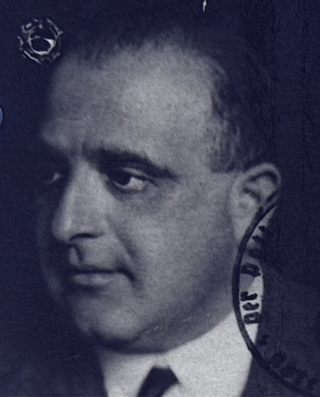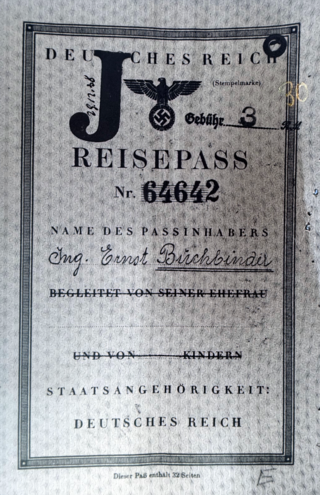DI Ernst Buchbinder

Personalia
Born:
Died:
Profession:
KZ Number:
Curriculum Vitae
Ernst Buchbinder was born in Moravian Ostrava [today: Ostrava in the Czech Republic] as the legitimate son of the head of the Creditreform association, Louis Buchbinder, and Eugenie, née Rosenbaum. He was one of four children in the Jewish family. After primary and lower secondary school, he attended the Landes-Oberrealschule in Moravian Ostrava, where he graduated in 1905. In the same year, he moved to Vienna and enrolled at the Technical University of Vienna [today: Vienna University of Technology], where he completed his studies in electrical engineering in 1910 and graduated in 1915. He then worked as an engineer in Vienna.
In 1922, Ernst Buchbinder married Margarete Korsower, who was also Jewish, and became the father of a son in 1924. After 1933, the patriotic Austrian and opponent of National Socialism became involved in the Vaterländische Front.
On March 12, 1938, Ernst Buchbinder witnessed the demise of free and independent Austria with the invasion of the German Wehrmacht. With the occupation of Austria, German legislation was adopted and with it the 'Nuremberg Racial Laws', according to which Ernst Buchsbaum and his family were considered 'full Jews'.
On 28 March 1938, Ernst Buchbinder was murdered. Ernst Buchbinder was arrested by the Gestapo on March 28, 1938 and deported to the Dachau concentration camp on April 2, 1938 on the so-called 'Prominent Transport'. On April 30, 1938, he was transferred to the Gestapo in Vienna for interrogation, where he was mistreated to such an extent that he remained deaf for the rest of his life. On July 16, 1938, he was transferred back to Dachau concentration camp and on September 23, 1938, he was transferred to Buchenwald concentration camp. He was released on June 24, 1939, on the condition that he leave the country as soon as possible.
He left occupied Austria with his family and arrived in the United States five days after the outbreak of World War II, on September 6, 1939. He settles in New York and works as a technician in the chemical industry. On 14 December 1944, he became a US citizen with the Certificate of Naturalization.
In the United States of America, Ernst Buchbinder and his family experienced the liberation of Austria and the re-establishment of the Republic in April and May 1945. However, they decided not to return home and remained in New York.
On March 12, 1938, Ernst Buchbinder witnessed the demise of a free and independent Austria with the invasion of the German Wehrmacht. With the occupation of Austria, German legislation was adopted and with it the 'Nuremberg Race Laws', according to which Ernst Buchsbaum and his family were considered 'full Jews'.
On 28 March 1938, Ernst Buchbinder was arrested by the Gestapo. Ernst Buchbinder was arrested by the Gestapo on March 28, 1938 and deported to the Dachau concentration camp on April 2, 1938 on the so-called 'Prominent Transport'. On April 30, 1938, he was transferred to the Gestapo in Vienna for interrogation, where he was mistreated to such an extent that he remained deaf for the rest of his life. On July 16, 1938, he was transferred back to Dachau concentration camp and on September 23, 1938, he was transferred to Buchenwald concentration camp. He was released on June 24, 1939, on the condition that he leave the country as soon as possible.
He left occupied Austria with his family and arrived in the United States five days after the outbreak of World War II, on September 6, 1939. His entire fortune was expropriated by the National Socialists. His family only had 30 Reichsmarks when they arrived in the United States. He settles in New York and works as a technician in the chemical industry. On 14 December 1944, he became a US citizen with the Certificate of Naturalization.

In the United States of America, Ernst Buchbinder and his family experience the liberation of Austria and the re-establishment of the Republic in April and May 1945. However, they decide not to return home and stay in New York.
Places
Residence:
Persecution:
Citations
Wiener Stadt- und Landesarchiv (WStLA)
Dokumentationszentrum des österreichischen Widerstands (DÖW)
Archiv der Technischen Universität Wien
